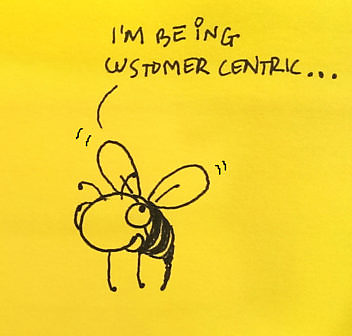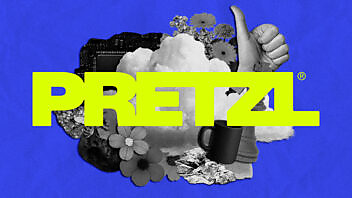“If I had asked my customers what they wanted they would have said a faster horse.”
– Henry Ford*
Buzzwords are a pain in the ass.
Especially when they make marketers abandon perfectly good marketing messages for flaccid ones that have been flogged to death.
(As a general rule, if the most interesting thing you have to say has already been said by everyone else in your industry, you’re probably better off saying the exact opposite.)
Recently, one buzzword is proving to be a particularly buzzy bee in my bonnet – customer centricity. And I’m a little bit more than a little bit sick of it. So I’m going to try and nip this asinine buzzword in the bud.
But first…
Why are we even talking about customer centricity all of a sudden?
If I had to guess, I’d say it all started with the relatively recent realization that customer experience actually matters. (Or more pointedly, that customer experience can actually be tracked and measured and tweaked.)
Now, in consumer markets, this probably wasn’t much of a newsflash. In consumer tech, if the person using your shit doesn’t like using your shit, your shit doesn’t stand much of a chance.
Meanwhile in enterprise software…
Let’s just say ‘user experience’ hasn’t traditionally been much of a priority here. Why? Well, as Jeff Hammerbacher, founder of Cloudera (foundera?) puts it:
“One of the things that really bothers me about enterprise software is that no one at the executive level is actually a user of the software.”
That isn’t to say the C-suite at McDonalds (McC-suite?) have McMuffins for breakfast.
But when the people who buy the product aren’t one of the hundreds of people who use the product, even the notion of ‘customer centricity’ is more than a little alien.
Why it’s hard to be customer centric
My knee jerk reaction to the idea of customer centricity was “what the hell else are you focusing on?” But there’s a whole world of distractions that can appear to be way more important than the customer – channels, processes, old product lines, politics.
Moreover, ‘customer centricity’ seems to suggest a laser focus on a specific group of people. But that’s actually just an illusion.
Which customer?
Do we mean the buyer? The influencer? The user? The company?**
Indeed, if you’re using ‘customer centricity’ as a brand message (more on that in a sec) you’re probably conflating the word ‘customer’ with the word ‘prospect’ – again two very different types of people.
Now, at the latter stages of the tech adoption cycle when your current customers look a lot like the prospects you’re going after, it might be fine to be and/or claim to be ‘customer centric’.
But what about when you switch from early adopters to pragmatists? What if you’re pivoting away from your current customer base towards a more lucrative segment?
All of this is before we even consider the biggest obstacle to ‘customer centricity’ – the innovator’s dilemma.
The customer isn’t always right.
In fact, compared to the brilliant innovators you hired, you’d be forgiven for thinking your customer’s a goddamn idiot.
Microsoft Excel’s dominance as the data analysis tool of choice isn’t coming to an end just because of Google Sheets. It’s happening because of a whole host of smarter solutions for more specific analytic use cases.
If you’d asked an Excel power user five years ago what Excel needed to innovate they’d probably have said something like ‘stick it in the cloud’.
–
All of these are non-trivial choices and issues with ‘customer centricity’ as a strategy.
But even though it’s both an important and difficult thing to strive for, it has some fatal flaws as a marketing message.
1. It doesn’t intrigue
Claiming or even promising ‘customer centricity’ doesn’t make people lean in. It’s table stakes. And no one is going to give you a pat on the back for doing exactly what you should be doing.
2. It doesn’t differentiate
Like I said, my first reaction was “what the hell else are you focusing on?” Unless you’re going to viciously take your competitors down (always a fun idea) and punctuate those messages with a claim of customer centricity, you aren’t going to sound special at all.
3. It doesn’t explain
All the sacrifice and complexity and nuance you have to overcome and manage to actually focus on your customers usually gets lost when you bucket it under the polyanna positive title of ‘customer centricity’.
If you’re going to gloss over the good stuff, at least pay it off with a message that’s genuinely interesting.
–
If your go-to-market strategy involves a wafer-thin claim wrapped in an asinine message that doesn’t excite, explain or differentiate you, you’re going to have a pretty hard time.
But I guess that’s the power of the buzzword.
The shit gets said so often it gives the illusion that it’s something every cares about. It makes even the smartest marketers eschew originality and depth for the sake of what appears to be a popular message.
All the while forgetting that what they’re really here to do is not sound like everyone else.
—
*Or not Henry Ford
**In agencies, the ‘which customer do you mean’ game is a particularly fun one. Do we mean our client the person or the organization? Do we mean her boss? Wait, do we mean her customers? Maybe we mean her customers’ customers? Shit can get very meta very fast.

Enjoyed this article?
Take part in the discussion









Comments
Jay Manahan June 15th, 2015
Another post that got me nodding like a bobble-head doll. Thanks for giving me the much-needed profanity-laced ammo to shoot down suggestions like “relentlessly looking for different areas in the operation that will contribute that percentage point increase” (no context necessary, that’s the whole of it).
Harendra Kapur June 23rd, 2015
Glad it helped Jay. I’m liable to steal ‘profanity-laced ammo’ for my business cards.
Joseph Hansen October 16th, 2015
It helps me widen my knowledge about customer centricity and the difference between customer and prospect. Customer has always been an important factor in any business. But we have to know of course the right customer for our business because not all customer is the right one for you.
Jenna June 23rd, 2024
It’s 2024 now….is your head exploding over the word “niche” or phrase, “niche down”…all while “scaling”?
Okay…